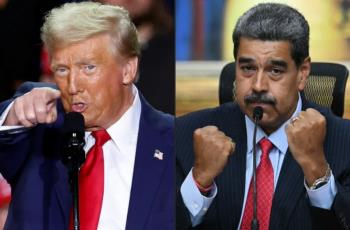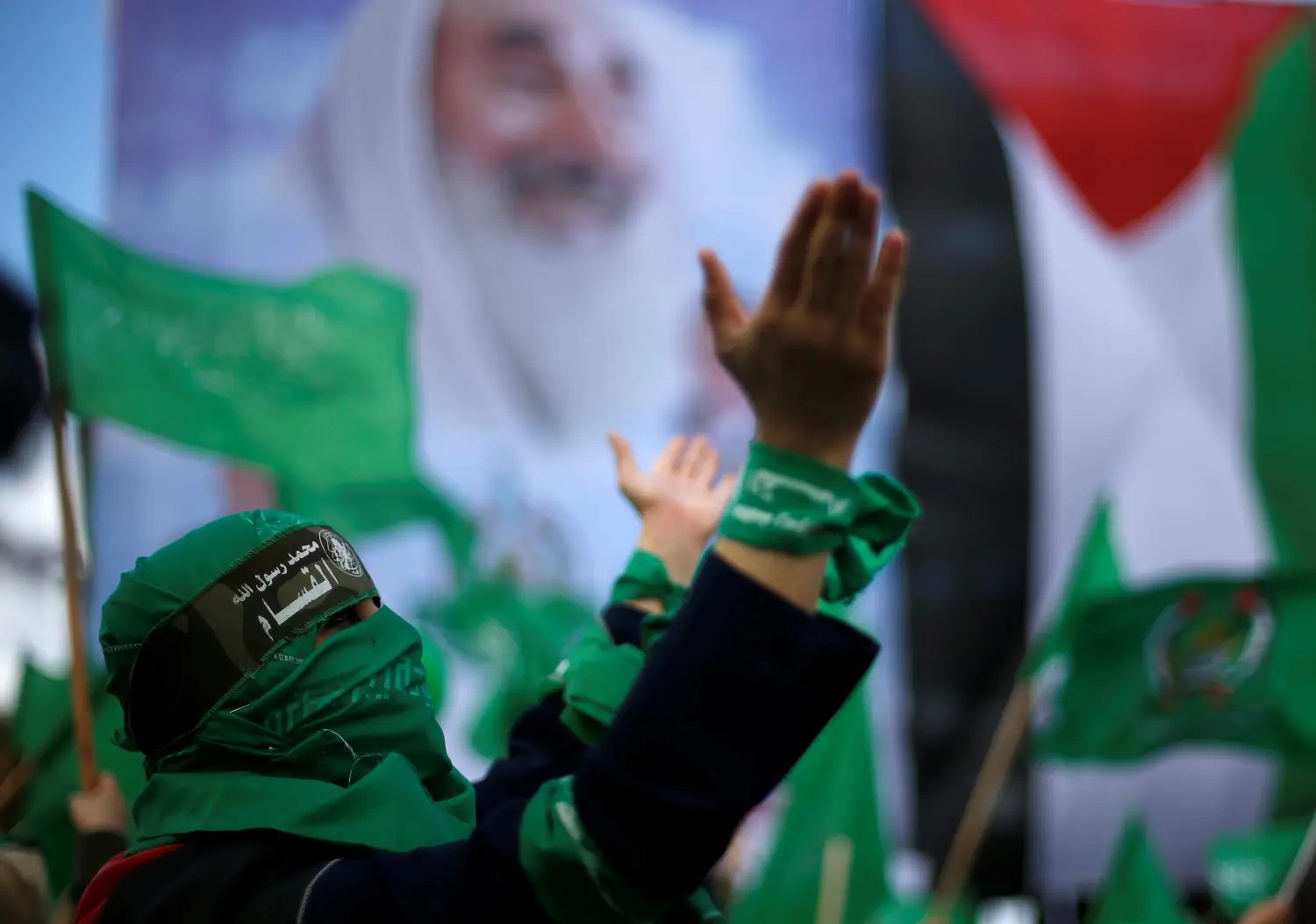Alwaght- A day before end of Trump's ultimatum to Hamas to respond to the 20-point peace plan about the end of war, the leaders of the Palestinian resistance movement have delivered their response to the mediators.
They said that despite their initial agreement with the general framework of the plan, there is still a need to discuss the details.
Senior Hamas official Mousa Abu Marzouk told Al Jazeera that the group's priority is "stopping the war and the slaughter," and on that basis, they view the current proposal positively. However, he emphasized that implementing the plan's terms requires further details and mutual understanding, stating bluntly, "this plan cannot be executed without negotiation."
"We are prepared to negotiate on all issues concerning the movement and its weapons," he added.
He dismissed a key element of the proposal—the handover of prisoners and bodies within 72 hours—as "theoretical and unrealistic under the current conditions." He further called on the US to "view the future of the Palestinian nation with a positive outlook."
On the contentious issue of who will govern Gaza after the war, the Hamas official was explicit, saying: "We have reached a national agreement to hand over the administration of Gaza to independent technocrats, and the authority for this administration will be the Palestinian Authority." He framed the future of the Palestinian people as a "national issue that Hamas will not decide unilaterally."
This position aligns with a previous agreement made in Cairo between Hamas and Fatah leaders in late 2023 to form a technocratic government with the participation of all political factions.
Regarding a separate regional and international proposal from Egypt concerning peace and the future, Abu Marzouk confirmed, "We have agreed to the plan."
He also pushed back against the proposal's terminology, asserting, "Hamas is a national liberation movement, and the definition of 'terrorism' included in this plan cannot be applied to it."
Finally, on the critical question of the weapons held by Palestinian resistance factions, Abu Marzouk made a significant declaration: "We will hand over the weapons to the future Palestinian state. Whoever will govern Gaza will hold the weapons."
Gaza will not be handed over to foreigners
Osama Hamdan, another senior official of Hamas, told Al-Araby news network of Qatar that this movement is ready to immediately engage in talks about a prisoner swap deal. He said" we will not accept, under any circumstances, any party outside Palestine assuming the administration of Gaza."
The Hamas official further emphasized that upcoming negotiations must consider the actual situation and facts on the ground regarding Israeli prisoners. He stated that the prisoner exchange process requires more than 72 hours, noting that this issue can only be resolved by reaching a mutual understanding between the parties. He reiterated that "the entry of any foreign administration or forces into Gaza is absolutely unacceptable."
In a related statement, Taher al-Nono, media advisor to the head of Hamas's political bureau, said: "We are ready for immediate negotiations regarding prisoner swap, ceasefire, and Israeli withdrawal from Gaza. Hamas is prepared to immediately begin negotiations to conclude a prisoner exchange operation, end the war, and secure the withdrawal of the Israeli army from Gaza."
World welcomes Hamas’s response
Hamas' formal response to the Trump administration's peace proposal has been met with widespread international and regional approval, with many hailing it as a significant breakthrough that could end the two-year genocidal war in Gaza.
In a post on his Truth Social platform, former Trump stated: "Based on the statement released by Hamas, I believe they are ready for a lasting peace. Israel must immediately halt the bombing of Gaza so we can safely and swiftly extract the prisoners. Doing so now is too dangerous. We are currently negotiating the operational details." A White House spokesperson confirmed that Trump would respond formally to Hamas' acceptance.
British Prime Minister Keir Starmer welcomed Hamas' position, calling it a "historic opportunity and a step forward for the region."
French President Emmanuel Macron declared, "Hamas' commitment must be implemented without delay. We now have an opportunity to achieve decisive progress towards peace."
German Chancellor Friedrich Merz stated this was "the best chance for achieving peace in Gaza."
Colombian President Gustavo Petro affirmed, "I agree with Trump on the demand to stop the genocide in Gaza."
Turkish President Recep Tayyip Erdogan described Hamas' reply as "a constructive and vital step towards a lasting peace." He added "what must happen now is for Israel to immediately cease all attacks and commit to the ceasefire framework."
The Dutch Foreign Minister David van Weel expressed cautious optimism, noting, "it appears Hamas is prepared to release Israeli captives and engage in direct talks on the Trump peace plan." His Austrian counterpart emphasized that "the release of the Israeli captives and a ceasefire are within reach, and we stand ready to assist in this process."
Italian Prime Minister Georgia Meloni affirmed Rome's support for the efforts and the necessity of a truce, stating, "we are closely following developments in Gaza and confirm our full support for Trump's efforts to establish peace in the Middle East."
Reacting to Hamas' principled agreement, Australian Prime Minister Anthony Albanese reiterated Canberra's support for efforts to end the war.
The Irish PM welcomed the recent developments, expressing hope they would lead to an end of hostilities.
A Qatari foreign ministry spokesman said, "we welcome the announcement of Hamas' agreement with Trump's proposal to end the Gaza war and its readiness to release all Israeli captives within the proposed prisoner swap framework."
The Egyptian foreign ministry, appreciating Hamas' move, expressed hope that "all parties will fulfill their responsibilities to implement the Trump plan and end the war."
UN Secretary-General António Guterres, voicing his contentment with Hamas' response, called on all sides to seize this opportunity to end the war in the Palestinian costal enclave.
Hamas committed to Palestinian interests
Though Hamas and Netanyahu tried to set their plan in a way to make the biggest interests for Tel Aviv and the least for the Palestinians, at the end of the road it was Hamas that, disregarding the White House threats, set its conditions for a deal.
The disastrous humanitarian conditions in Gaza Strip make it even necessary for the Israelis bombings to fully stop and aids be delivered to the impoverished Gazans without limits.
Furthermore, Hamas's positions demonstrate that the resistance is unwilling to compromise on the fundamental principles and interests of the Palestinian people, particularly the right to armed resistance. Consequently, as explicitly stated in their official response, the movement will not surrender its weapons to foreign forces but will instead place them under the authority of Palestinian institutions governing Gaza. From the Palestinian perspective, these weapons serve as a crucial deterrent against a full reoccupation of the strip. There is a prevailing belief that without this deterrent, and given a deep-seated distrust in the US and the Israeli regime to uphold their commitments, the path would be cleared for the implementation of what they describe as the "Zionist enemy's evil plans."
Hamas has also unequivocally declared that decision-making regarding the political future of the Palestinians is not a right granted to foreign powers. In other words, Hamas's efforts to diminish foreign influence and intervention in the administration of Gaza have effectively rendered Trump's envisioned " Riviera of the Middle East" an unattainable fantasy.
Moreover, the rejection of handing over all captives within a 72-hour period stems from a pragmatic understanding of the situation on the ground. Hamas leaders are acutely aware that releasing all captives at once would strip them of their most significant bargaining chip. Losing this leverage could empower Netanyahu and his hard-line allies to execute dangerous plans for Gaza—a scenario Hamas is intelligently maneuvering to prevent.
What does Trump think?
Though Hamas with a good will responded positively to the Trump's plan, the fate of this deal largely rests on the US administration's commitment. Now the eyes are on the White House to see if it accepts the amendments proposed by Hamas, or still choose to press ahead with its strict stances.
If the Trump administration shows flexibility, a window may open to de-escalate tensions and begin a new path in the Gaza crisis. However, if it rejects this and adheres to its original unilateral demands, the risk of a return to the cycle of violence remains high. As Trump himself has acknowledged, a renewed flare-up of conflict is a distinct possibility.
While the White House has stated it will review Hamas's response and make a decision, the reality is that the Trump administration has no alternative plan to offer the Palestinian factions and may ultimately be compelled to work with this one.
Otherwise, continuing a policy of escalation and alignment with Tel Aviv's actions will only invite greater international pressure on Washington—a dynamic already evident at the recent UN General Assembly. Now that Hamas has demonstrated its goodwill, the ball is in the court of Trump and Netanyahu to prove whether they possess a genuine will to end the war.
Distrust in Israel
Hamas’s response can transform the way Israel and Trump will move next. The completely unilateral conditions in favor of Israel motivated Netanyahu to rush to voice support to thru deal. At the White House, he said that he was for Trump's plan since it meets all of Israeli war objectives.
Hamas's specific reservations on the proposed deal appear to have impacted the initial Israeli assessment, unsettling its preliminary interest in negotiations.
Although Netanyahu's office, following Hamas's response and Trump's call to stop the war, claimed it was preparing to execute the first phase of the Trump plan for prisoner release, and reports suggest a halt to the occupation of Gaza City, some sources confirm that the radical hardline of Benjamin Netanyahu has no intention of ending the war with the Palestinians.
Axios, quoting an Israeli official, reported that Netanyahu was surprised by Trump's response. This Tel Aviv official told Axios that in consultations prior to Trump's statement, Netanyahu had considered Hamas's reply to be a rejection of the deal.
According to this Israeli official, "Netanyahu emphasized the need to coordinate with the Americans to ensure the perception that Hamas responded positively to the deal does not take hold." However, Israeli technical bodies reviewing the prisoner case have assessed Hamas's response positively and see it as a path to an agreement.
Despite Hamas's positive response to the Trump proposal, past experience and the composition of the Israeli cabinet make it entirely plausible that implementing any agreement could face sabotage or even a return to all-out war.
In the past two years, Tel Aviv officials have repeatedly resorted to escalation and military attacks during negotiations rather than acting on their commitments. The presence of hardliners like National Security Minister Itamar Ben-Gvir and Finance Minister Bezalel Smotrich has further compounded the already twisted situation. These ministers have repeatedly warned they would leave the coalition government if Netanyahu strikes a deal with Hamas—a threat that severely weakens Netanyahu's political standing.
Therefore, many analysts believe Netanyahu may have no choice but to continue the war and tension to maintain his coalition's cohesion and prevent its collapse. In this climate, while the agreement on paper seems positive, there is a significant risk that the Israeli regime will accuse Hamas of obstruction or violating terms, finding a pretext to resume its aerial and ground assaults on Gaza.
Supporting this skepticism is the insane attacks on civilians hours after Hamas announced its response, resulting in dozens of casualties. These actions demonstrate that the extremist Netanyahu government cannot be trusted to fulfill its promises.
Hamas ready for all scenarios
Hamas’s response shows that the Palestinian resistance is not afraid of military threats and all of its actions are done based on the principles of resistance. Successful operations against the Israeli occupation forces and their circulation online shows that this movement is fully ready for all scenarios. So, implicit agreement with Trump's plan never means surrender to the enemy and so the movement still holds its commitment to the Palestinian interests.
Despite intense pressure from Washington and Tel Aviv to sideline Hamas from the political and military governance of Gaza, the movement continues to enjoy significant popular support. Simply weakening the resistance remains a formidable challenge.
On the other side, if the Palestinian Authority attempts to reassume control over Gaza's administration, it is unlikely to succeed given its lack of popularity among the strip's inhabitants. Just as it was defeated in the 2006 elections and forced to leave Gaza, this scenario could simply repeat itself.
In summary, Hamas has not been checkmated by the Trump administration's plan for Gaza. Rather, Palestinian resistance movement has adeptly navigated the chessboard laid out by Trump and Netanyahu. Through a shrewd strategy and the repositioning of key pieces, it has parried the opponent's check and placed the adversary in a position of checkmate. This indicates that ultimately it is the resistance that will dictate the final outcome of this war as it holds the initiative on the ground.



























